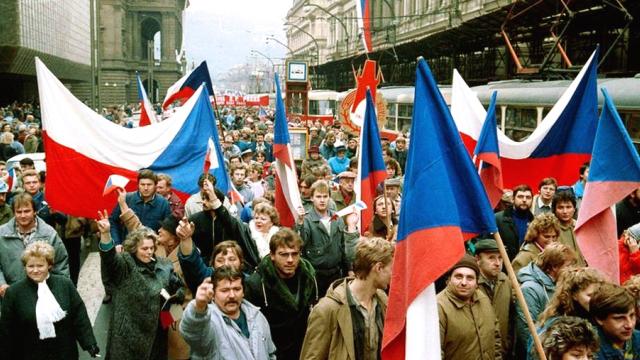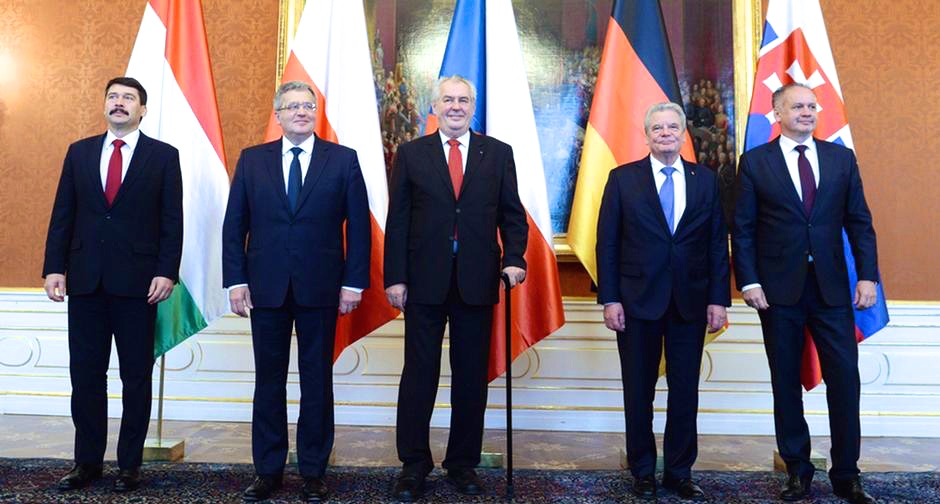
Thousands gathered Monday on Prague's Wenceslas Square, where, exactly 25 years ago, police assaulted protesters, precipitating the Velvet Revolution a week after demonstrators toppled the Berlin Wall 190 miles north.
Preceded by a November 16 protest in Bratislava, the capital of Slovakia, the demonstrations of November 17, 1989, had begun on the campus of Charles University with fiery speeches against the Soviet-style communist regime.
Downtown, police blocked the street from both sides, squeezing the protesters with armed vehicles before attacking them with truncheons, injuring hundreds but breaking the spirits of few. The crowds grew in the days that followed, culminating with the resignation of the entire leadership of the Czechoslovak Communist Party on November 27, 1989.
On December 29, the Federal Assembly made playwright Vaclav Havel Czechoslovakia's first democratic president since Stalin-approved Klement Gottwald took office in 1948. Havel helped Czechoslovakia – and, from 1993, following the Velvet Divorce, the Czech Republic – become a champion of human rights.
Many Czechs believe that the current president, Milos Zeman, has betrayed the legacy of the playwright-president, who died in 2011.
"What Europe is"
Zeman has supported Russia on Ukraine, praised China and downplayed Soviet-era police brutality. In a recent radio interview, he called Pussy Riot a pornographic band and used a vulgar term to describe their name, concluding that the artists, sentenced to Russian labor camps for their protests, were not political prisoners.
Critics call these missteps proof that Zeman has worn out his welcome in Prague castle.
On Monday, Zeman hosted Germany's own president, Joachim Gauck, in addition to the leaders of the other Visegrad states: Slovakia, Poland and Hungary.
Before he went to Prague on Monday to celebrate the anniversary with his former neighbors behind the Iron Curtain, Gauck went to the "gateway to freedom" on the Austria-Slovakia border to remember those who had not survived Soviet-style communism.
Since June, the five presidents have commemorated the 25th anniversary of that system's end together in Warsaw, Budapest and Leipzig. On Sunday they were joined by current Ukrainian President Petro Poroshenko in Bratislava, and on Monday all attended the commemorations in Prague.
"Those who want to understand today what Europe is must know where we came from," Gauck said Monday at the site on the Danube where more than 400 people had died trying to escape Czechoslovakia.
During the commemorations, German President Gauck received an egg to the head, thrown by a protester. A spokesman for the Czech president said the egg was intended for Zeman.
*
Meanwhile, Al Jazeera America reported that thousands of protesters also swarmed Hungary's capital on Monday, angered by corruption allegations against the authoritarian-leaning government of Viktor Orban:
More than 10,000 Hungarians rallied in Budapest on Monday to demand the resignation of Prime Minister Viktor Orban, accusing him of employing corrupt public servants and cosying up to the Kremlin.
The numbers who turned up at Parliament for the rally — billed by organizers as a "Day of Public Outrage" — were much smaller than the crowds that protested a planned tax on the Internet last month and forced Orban to shelve the plan.
Alleged corruption has become a new rallying cry for Orban's opponents after the United States said it was barring entry to six Hungarian public servants, including the head of the tax authority, on suspicion of being associated with graft.
Although Hungary — like many former Eastern Bloc countries — adopted the form and institutions of a liberal democracy following the collapse of the Soviet Union, Orban's government has tilted in a more authoritarian direction. In late July, he said publicly that he wanted to construct an "illiberal state" in the mold of Vladimir Putin's Russia.
The Internet tax and the corruption allegations have slightly weakened public support for Orban's center-right Fidesz party. But it still leads by a wide margin over the fragmented opposition, which includes several left-wing parties and the far-right nationalist party Jobbik.
The protesters chanted "Orban go away!" and held up banners with slogans including: "We don't pay tax to criminals." They chanted "Europe, Europe!" after two people lowered a European Union flag from a window of the neo-gothic Parliament building.
Tax chief Ildiko Vida said early this month she was one of several people — including government officials — who were barred entry by the United States on charges of corruption. She denied any wrongdoing.
One banner at Monday's protest read, "People against corruption, so much for the two-thirds," referring to election victories in which Fidesz secured two-thirds parliament majorities in 2010 and then again in April this year.
Several opposition politicians were in the crowd but there were no party symbols, as requested by the organizers.
Protest organizers — a loose collective of students, activists and artists — have said that they have tapped into a groundswell of indignation.
One protester, Gyorgy Brull, said he and millions of Hungarians had no party to vote for. "I have clear ideas on what country I would like to live in," the 57-year-old winemaker said. "But I still do not see who could represent that in a coherent way."
3 WAYS TO SHOW YOUR SUPPORT
- Log in to post comments












